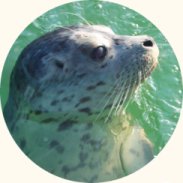
Introduction
1.1 Introduction
1.2 Study Area
1.3 Background Research

Introduction
1.1 Introduction
1.2 Study Area
1.3 Background Research
1.1 Introduction
Known officially as the Marine Mammal Rescue and Rehabilitation Centre, the site is referred to as "Seal Rehab" as Harbour Seals are the main animal. I have been volunteering for the past two summers at this site through the Vancouver Aquarium Marine Science Centre. This past summer, I was talking to the head of Seal Rehab about how 2001 may be their last year at the current location as their lease runs out in early 2002 and they may not be able to renew it. When I received the handout for the project, I thought this would be an interesting project to do since it is more of a "real life" scenario than other things I may have chosen. Also, it allowed me to put up all my pictures that I have taken over the past couple of years!

Current Site
1.3 Study Area
The Current Rehabilitation Site is at an undisclosed location (due to the fact that it is quarantined). It operates primarily between May to November as that is the peak season for Harbour Seal pups being born but will take any sick or injured marine mammals year round. As you can see in the above photo, the existing site has just enough room to keep everything. Currently, it is on 2 adjoining helicopter pads and some grassy area. There is just enough room for everything, including 2 trailers (one medical and one for an office/food preparation area), 2 above ground swimming pools, and approximately 30 individual containers. Since the seals do need salt water, it is necessary for the site to be next to, or at least near, salt water. The seals stay at the Marine Mammal Rescue and Rehabilitation site until they are thought to be ready for release (this includes catching and eating life fish) which takes roughly 2-3 months.
1.2 Background Research
The program rescues between 75 and 100 animals annually with the Vancouver Aquarium Marine Science Centre spending between $70,000 and $100,000 annually. The program is supported by the BC SPCA and several airlines that will transport seals from all over the BC coast to the rehabilitation site.
Most often, pups arrive because their mothers have abandoned them. This can be for a variety of reasons, the main one being that they don't recognize the scent of their offspring anymore. When hunting for food, mother seals often leave pups onshore for up to twenty-four hours. They will not return if they see someone (or an animal) near the pup.
If you spot a seal pup that may have been abandoned, don't touch it. Keep all pets away and watch the pup from a distance for at least 24 hours. This will give the mother time to return if she is away hunting in the ocean.